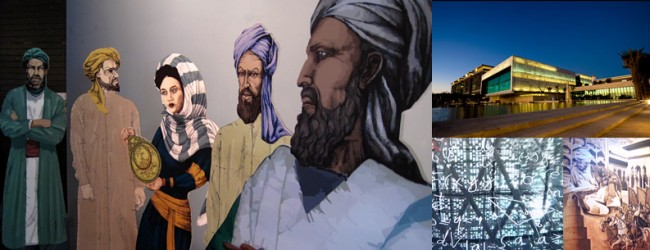
By Rashid Iftikhar
In a nutshell, Muslim history began with the scientific golden age (800-1250), followed up by a total collapse in the scientific arena for seven hundred years and now in the twentieth century, there are efforts to pull things back, but all in vain.
“There isn’t anything to worry about between science and religion, because the contradictions are just in your own mind. Of course they are there, but they are not in the Lord’s mind because He made the whole thing, so there is a way, if we are smart enough, to understand them so that we will not have any contradictions.”
-Henry J. Eyring
In the past two millenniums, no religion was ever thought of interfering with its followers in matters of scientific progress, including the golden age, in which the West were lagging. Decline in science can be attributed greatly to the cultural differences between the Eastern and non-Muslim Western nations. Religions and cultures are values of a system and both are practiced simultaneously.
A brief history of the Eastern Muslim world and the most developed countries of the West would suggest, that the latter was culturally discrete from the Muslim world. These differences began to proffer, when the Muslim world tended to stagnate and things began to become worse, while the Western nations surged ahead i.e. in the thirteenth century.
Some of the factors resulted directly or as a result of cultural mining, including political instability, leading to the Mongol and other Central Asian invasions, lack of individualism i.e. collectivism promoted large-scale agriculture and irrigation systems, ethical approaches preventing cross cultural integration and tenets for women not to be a part of the education system. The cumulative effect of these multiple factors, brought an impeding science impact on the Muslim world.
However, there is hope, that the Muslim world will again flourish in the near future, as science and technology are now believed to be potential ingredients for a nation’s progress. Economic globalization is dispersing western technologies throughout the east, promoting unprecedented science ideology. Eastern governments have realized the importance of science directed efforts towards economic welfare and attempts are being made to develop research capabilities, through wide research policies implementation and research cooperation between private and government sectors. Although the scientific future of Muslim world will be on the rise, but this does not guarantee the return of the golden era.
The revival of science and technology in the East demands much more commitment and resources, at the global through local levels. Lack of financial resources, private sector involvement, quality education programs, research-management capabilities, industrial cooperation and incentives to perform, had been a major barrier to research outputs. National efforts producing more theoretical than practical output and researchers leaving their regions to obtain advanced coaching, are the other major drawbacks.
Lastly, Eastern governments have preferred to buy technology, rather than thinking about building their own capacities. Significant progress in science demands sufficient long term financial resources and individualism. Effective science education at all levels would be a handful asset, as science and technology research is not adequately institutionalized in most countries. The implementation of science and technology policy, must take place at a global level, together with establishing links between the public and private sectors. Conservative views on women’s education have restricted development and created an environment devoid of research. ‘
To conclude, cooperation at the international level is desired for scientific investigations by Eastern societies and these investigations demand a link between the physical and spiritual spheres. A critical analysis of Muslim history reveals, that most of Muslim scientists and scholars of the golden era, were also eminent scholars of Islam and theology. An approach to supplicate thinking with spirituality is required, in order to influence scientific learning in Muslim societies.
“Surely, In the creation of the heavens and the earth; in the alternation of the night and the day, in the sailing of the ships through the ocean for the profit of mankind; in the rain which Allah sends down from the skies, with which He revives the earth after its death and spreads in it all kinds of animals, in the change of the winds and the clouds between the sky and the earth that are made subservient, there are signs for rational people.”
-(Qur’an; 2:164)
You must be logged in to post a comment.